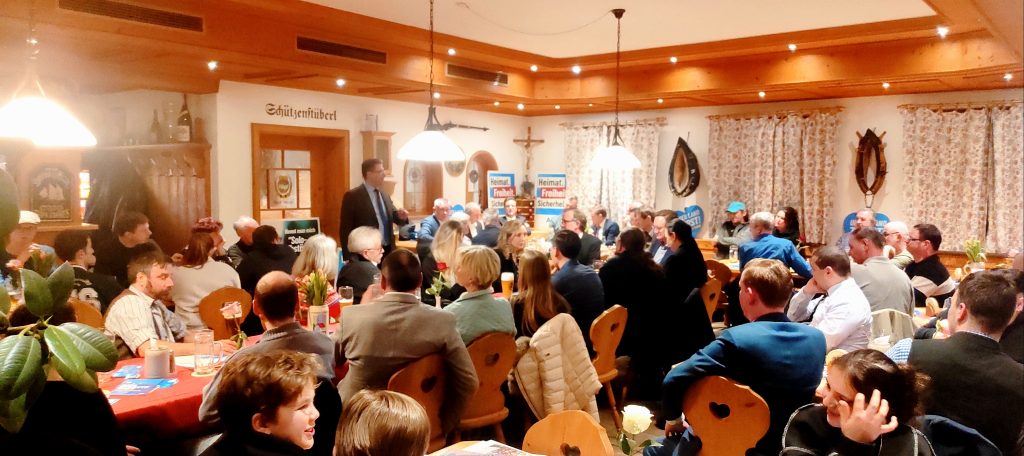On March 9, 2024, a panel discussion on the topic “So good ist the AfD for the economy” took place in the Miesbach AfD district association under the motto.
Over 60 guests from Upper Bavaria and some from all over Germany came together, including a former major bank director, an entrepreneur and several members of the AfD’s state and federal parliaments, to learn more about the AfD’s tax and economic policy in a traditional atmosphere. The evening was moderated by the MIWI economist Yuri Kofner, who explained the choice of topic and highlighted the AfD’s goals in economic policy.
High-ranking AfD officials and elected representatives introduced the guests to various areas of blue economic policy with their greetings. Andreas Winhart, budget policy spokesman for the AfD parliamentary group in the Bavarian state parliament, invited people to an upcoming information evening about the Bavarian state budget. Gerrit Huy, member of the AfD parliamentary group in the German Bundestag and speaker in the Federal Committee for “Economic and Social Affairs”, criticized the planned benefit cuts for German pensioners and the waste of taxpayers’ money on questionable “development aid”. Dimitri Schulz, housing policy spokesman for the AfD parliamentary group in the Hessian state parliament and founder of the Jews in the AfD, promised a comprehensive abolition of property tax and property transfer tax if the AfD participates in government. Wolfgang Wiehle, member of the Bundestag and district chairman of the AfD Upper Bavaria, dismantled Habeck’s energy policy as an “industrial-political suicide mission” and emphasized the party’s plan to cancel all CO2 taxes and lift the sanctions.
Kay Gottschalk, the financial policy spokesman for the AfD parliamentary group in the German Bundestag and deputy chairwoman of the AfD NRW, opened the discussion with a quote from Ludwig Erhard, the father of the German economic miracle. He emphasized the need to free the economy from state control and unleash market forces. The AfD aims to revive the successful recipe of the social market economy by calling for drastic measures such as increasing income tax allowances, reducing energy taxes and corporate taxation, and abolishing inheritance tax.
A special surprise guest, a former managing director of a major bank with management experience in leading global consulting firms, supported these views and revealed the frustration of DAX boards with the current economic development. Unfortunately, the serious consequences of the forced “green transformation” are already more advanced than many assume. These views would be echoed by many German entrepreneurs who, behind closed doors, speak in a similar way to the AfD and, like the Alternative for Germany, demand a drastic reduction in taxes and bureaucracy, a stabilization of energy supplies and a sensible immigration policy.
Dieter Arnold, member of the AfD parliamentary group in the Bavarian state parliament and head of a medium-sized family business with 200 employees, including several with a migrant background, explained how the AfD would win back skilled workers. He emphasized the importance of an education policy with a focus on MINT and crafts as well as incentives for the return of emigrated Germans.

